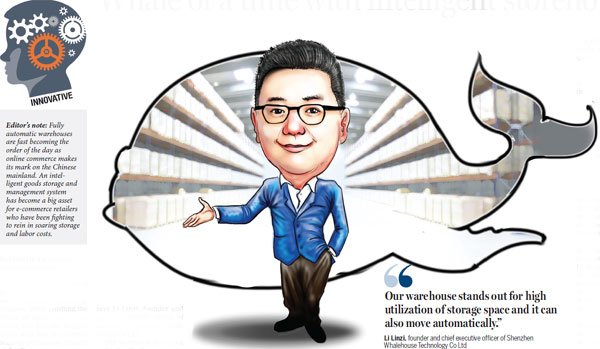Whale of a time with intelligent storehouses

With the rapid advent of online shopping on the Chinese mainland, e-commerce retailers, while relishing the fruits of their new-found trade, are equally bogged down with how to confront soaring production storage and order picking costs.
An intelligent warehouse provider in Shenzhen has risen to the occasion, offering a solution that can substantially cut costs for both warehouse labor and space.
Certain large retailers like the mainland's JD.com and Amazon in the United States have equipped their warehouses with AGV (automatic guided vehicle) robots to move shelves to a fixed point so that workers don't need to traipse around.
But these warehouses solely focus on "automatic" so labor efficiency could be improved, says Li Linzi, founder and chief executive officer of Shenzhen Whalehouse Technology Co Ltd.
"Our warehouse stands out for high utilization of storage space and it can also move automatically."
Instead of using plenty of turtle-like robots to move shelves around, the shelves in Li's warehouse rotate automatically in a circle of two rows, powered by a pusher at the end of each row.
At the other end of each row is a gate. When a shelf rotates to the gate, it stops for workers to pick up products that have been ordered in different boxes on the shelf.
Li explains there's no need to leave any space between the shelves for them to move or for workers to walk, so the warehouse's space can be fully utilized.
One of his three warehouses in Shenzhen measures about 3,000 square meters and can accommodate 70 workers. It equals to an area of 15,000 square meters with 150 workers to deal with the same amount of orders in the traditional way.
But, if managed by the traditional order-picking process, the automatic system can't give its efficiency full play. So, the startup has developed an operating software system that's completely opposite to the mainstream concept.
Traditionally, when an order is made, the e-retailer's workers will search the warehouse to find the product according to the order.
But, at Whalehouse, when one shelf rotates to the gate, the system will find which product on the shelf is ordered, based on the unique code on each box and shelf, and send instructions to workers to pick it up.
Thanks to a self-developed algorithm, the system can split a large amount of orders into small groups to prepare all the orders as quickly as possible.
Li admits the system doesn't strictly comply with the principle of "first come, first served", but the time it needs is rather short. In addition, it's directly linked to the e-shop platform so the order information can be immediately and automatically transferred to the Whalehouse system.
"The software system shows a change from 'order finds product' to 'product finds order'," he says. "And, the rotating function is a physical change from 'people go to product' to 'product comes to people.'"
He believes the two changes in software and hardware are the keys of the patented and digitalized warehouse management system.
Since the launching of the new product, the company has earned the trust of half of the top 10 cross-boundary e-commerce traders in Shenzhen, he says.
It also adopts a co-sharing model, allowing clients to rent the place by day and product volume. "It's very convenient for retailers because they can spend according to various demands during the peak or off-season periods and avoid wasting as much as possible."
The 34-year-old entrepreneur joined the logistics unit of an online jewelry company in Shenzhen in 2008. Four years later, he founded the startup to operate warehouses for retailers. But, he did not begin focusing on automatic and intelligent warehouses until 2013 because of his firm belief that they're the future of the logistics storage industry.
Li is confident that intelligent warehouses will become popular in three years, and he plans to open more such facilities in the eastern and northern regions of the country, as well as in the United States, in the second half of this year.
Investments in automatic systems and equipment relating to the warehousing business had surged from 2.5 billion yuan in 2007 to 45.3 billion yuan in 2015, according to Shenzhen-based consultancy firm CIConsulting.
He Liming, chairman of the China Federation of Logistics and Purchasing, told the 2017 Global Smart Logistics Summit in Hangzhou in May that the entire logistics industry, driven by growing e-commerce consumption, is going through an intelligent upgrading.
Developing a fully automatic warehouse system can drastically enhance storage and management efficiency, He said.
grace@chinadailyhk.com
















